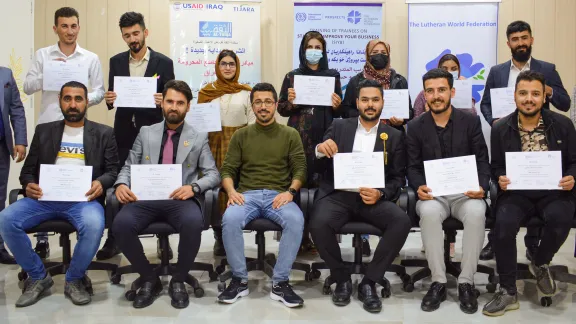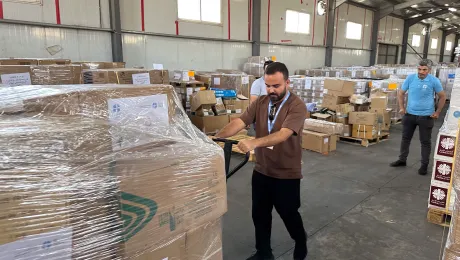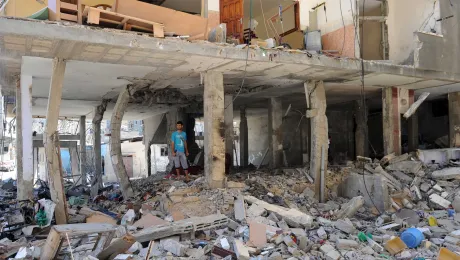
A group of students graduating from the SYB training in coordination with Thiqa bank in Duhok, Iraq. All photos: LWF/Iraq
PROSPECTS program supports skills and business training for refugees and host communities in Iraq and Ethiopia
(LWI) - The Lutheran World Federation (LWF) is partnering with the International Labour Organization (ILO) to improve access to employment and livelihood opportunities for young refugees, host communities, returnees and internally displaced people in Iraq and Ethiopia.
LWF has joined the PROSPECTS initiative, which brings together the ILO, the United Nations High Commissioner for Refugees (UNHCR) and Children’s Fund (UNICEF), as well as the World Bank and the International Finance Corporation. The program aims to provide dignified, inclusive and sustainable work opportunities for women and men, many of whom have spent years living in refugee settlements or displacement camps. At the same time, it seeks to support host communities that often have their own economic challenges and struggle to pursue their development agendas in areas that have been transformed by large movements of people.
In the Dohuk and Ninewa regions of Iraq, a thousand men and women from different ethnic and religious backgrounds are receiving business training and financial education to help them start or develop their own small or medium sized enterprises. Two hundred of them will then go on to be referred for the next stage of the program which includes access to financial services and loans.

Omer Abdullaziz Tater, one of the graduates of the financial education training in Duhok city, Iraq, funded by ILO-PROSPECTS.
One of the participants in Duhok city who has already benefitted from the program is 35-year-old Omer Abdullaziz Tater. He holds a bachelor's degree in architectural engineering and worked for a few years but, due to the pressure for jobs in the region, became unemployed. After receiving training through the program, he has applied for a loan to start his own architecture consultancy. He is also completing the process of compliance with government requirements and obtaining a license that all engineers must have to establish their own companies.
“The financial training has taught me to be more cautious with my expenditures,” Omer says, “and I have also been able to apply my learning experiences with my family too. I intend to go on and complete the training so that I can learn more about greening my projects, business plan development, market demand, potential risks and marketing skills.” Since October 2021, more than 600 men and women have graduated from the program in Iraq, including 119 refugees, 140 IDPs and 346 members of host communities.
Improving social cohesion in Iraq
A minimum 40 percent of those taking part in the program in Iraq are women, with a commitment to include people living with disabilities. As well as increasing job opportunities for the participants, the program aims to improve social cohesion between members of the host community, like Omer who are internally displaced Iraqis of different ethnicities, and the largely Syrian refugee population. The training encourages minorities and marginalized groups to develop relationships of trust, focusing on attitude changes and conflict transformation skills.
LWF’s Iraq Country Representative Rebecca Duerst praised the partnership with ILO which “is helping us meet our goal of improving livelihoods among these populations.” The PROSPECTS project, she added, “aligns with our strategy to promote more equitable access to livelihoods opportunities particularly for internally displaced, refugees and members of host communities who live in vulnerable situations. These groups often have less access to financial education and are excluded from accessing services to initiate or grow their business ideas.”
Similarly in Ethiopia, ILO and LWF have been working together since July 2021 to implement a holistic, multi-year job creation program in Kebribeyah, in the south-eastern Somali Regional State. This includes the renovation and expansion of a state-of-the-art vocational training center, as well as support for drip-irrigation farming and financial training to support enterprise creation.
Farming, construction, and financial training in Ethiopia
For the first year, the aim is to complete the rehabilitation and refurbishment of the classrooms and workshop. Teaching staff will be upskilled in the six professional sectors that make up the initial curriculum: finishing works in the construction industry, aluminium works, sanitary installation works, building electrical installation, irrigation technology (drip irrigation) and cobblestone laying. In addition, an initial first cohort of a hundred young men and women have been selected to start their training. These include both refugees and members of the local population to support harmonious relations between the two communities and provide long term development in the region.
We look forward to continuing this partnership with LWF and support sustainable change for the better in the lives of refugees and host communities.
“This is an exciting project that will have a deep impact in this emerging region of Ethiopia,” commented Sophie Gebreyes, LWF’s Ethiopia Representative. It has the potential to provide trainings in a wide variety of professional skills to thousands of young people, creating wages and self-employment to ease the burden of job creation on the government and provide dignified livelihood opportunities for both refugees and host communities,” she said. “Strong public-private sector collaboration between local authorities, beneficiaries, architects and businesses has been indispensable in enabling this project to move forward,” she added.
Nicholas Grisewood, Global Program Manager for PROSPECTS, hailed the partnership with LWF, saying: “We are pleased to see how our two respective organizations are advancing the program’s objectives on development responses to forced displacement, working efficiently and effectively in Ethiopia and Iraq. We look forward to continuing this partnership with LWF and support sustainable change for the better in the lives of refugees and host communities.”
LWF/P. Hitchen


